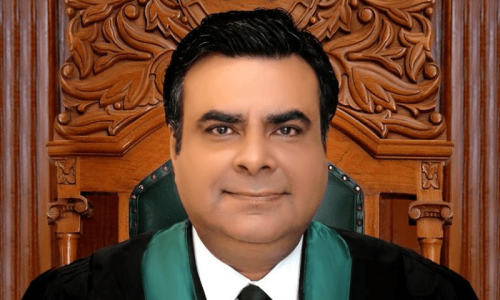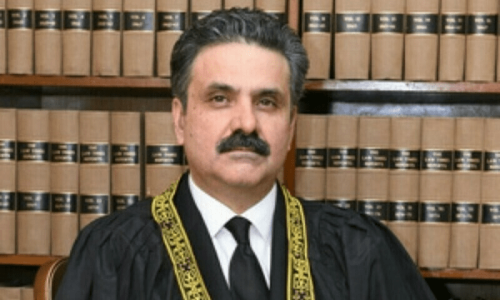PESHAWAR, July 10: Expressing dismay over their poor response in missing person cases, the Peshawar High Court on Tuesday warned the intelligence agencies not to force it into declaring the Action (In Aid of Civil Power) Regulation 2011 and the internment centres set up under it unconstitutional.
Hearing a habeas corpus petition, a bench comprising Chief Justice Dost Mohammad Khan and Justice Sajjad Hassan Shah directed the defence ministry to recover Hafiz Jalil Ahmad from the custody of Military Intelligence (MI) or other intelligence agencies forthwith, saying if its orders weren’t complied with, then action would be taken against the delinquent officials both under civil and military laws.
It asked additional advocate general Alamgir Durrani to inform the relevant quarters about its orders about production of the detainee on July 25, the next date of hearing.
The bench observed that during previous hearing when many constitutional petitions related to missing persons were heard, the government provided a list of 1,035 detainees who were freed and another list of 895 persons who were interned at notified internment centres.
However, it was added that the name of the detainee was not in any of the lists and that was an anomaly. The chief justice observed that the court shouldn’t be forced to lay hand on the special law — Action (In Aid of Civil Power) Regulation 2011 for Fata and Pata.
“We avoid it as the special law has already been challenged in the Supreme Court. Although it is also challenged in the high court through three petitions, we prefer waiting for the decision of the apex court in this respect,” Justice Dost Mohammad observed.
The chief justice pointed out that under the Constitution and Code of Criminal Procedure, an accused must be produced before the magistrate within 24 hours of the arrest.
“We will not allow law to be violated and they (intelligence agencies) cannot be given freehand to deal with arrested persons as they like,” he observed.
Justice Dost Mohammad said the special law stated that after arrest a detainee should be shifted to internment centre and rest of his interrogation should take place there. He added that had the law been followed in missing person cases, the situation would have better.
“We are running out of patience in missing person cases. Intelligence agencies should not push us into a situation where verdict will come against them and that all detention centres will be declared unconstitutional. This will land them in trouble,” he said.
The habeas corpus petition filed by a resident of Mardan, Jamil Ahmad, had challenged the alleged illegal detention of his son, Jalil Ahmad, by Major Shabir of Military Intelligence. He claimed that the detainee was picked up by intelligence agencies on May 2, 2010, kept in detention for a long period and was handed over to Daggar Police Station in Buner after he was found innocent. He was later shifted to Par Hoti police station from where he was freed shortly thereafter. The petitioner alleged that Major Shabir of MI rearrested Mr Jalil on February 27, 2012, with the help of local police and personnel of Baloch Regiment.
Meanwhile, the bench summoned the assistant political agent of Khyber Agency’s Jamrud tehsil in a habeas corpus petition challenging the alleged illegal detention of a second year student of Khyber Law College, University of Peshawar. The petition was filed by a woman, who alleged that police officials in plainclothes took away her son on June 19 night and after keeping him in different police station was finally handed over to the tribal administration of Jamrud. The bench fixed July 25 for the next hearing.
In another petition, the bench issued show cause notice to the Peshawar capital city police chief asking him to explain why police under his command had been indulging in illegal activities of detaining persons without authorisation of court.
In this regard a writ petition was filed by one Abid Ghani, saying on February 25, 2011, three of his relatives were detained by then SHO of Sarband police station Abidur Rehman, who later on set free two of them but one Muhammad Shafi had still been missing.
One of the released person, Younas, told the bench that he was detained in a toilet for 16 days. SHO Abidur Rehman denied his charges and said he was ready to state on oath that he had never arrested them.
The chief justice observed that on the order of the high court, the Khyber Pakhtunkhwa chief secretary had issued directives to all police officials not to support intelligence agencies in their illegal activities.
The bench fixed July 25 for next hearing with the direction to the CCPO to conduct extensive inquiry to trace the detainee.
In some other petitions, the bench directed deputy attorney general Mohammad Iqbal Mohmand to approach the ministries of interior and defence for tracing the people, who were allegedly in custody of intelligence agencies.















































Dear visitor, the comments section is undergoing an overhaul and will return soon.